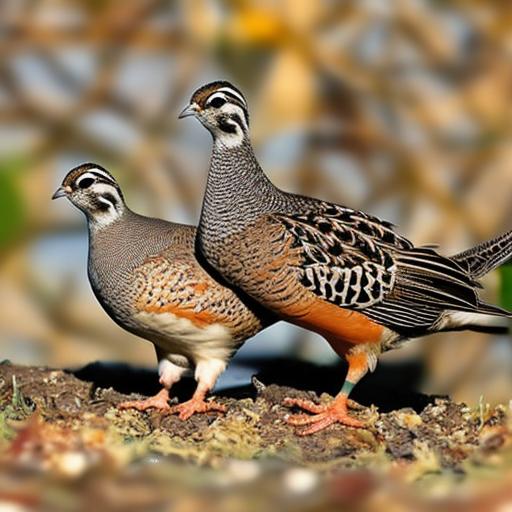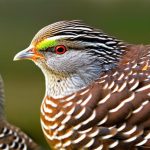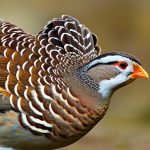Quails are small, ground-dwelling birds that belong to the pheasant family. They are known for their gentle nature, low maintenance, and beautiful plumage, making them popular pets for bird enthusiasts. Quails come in various species, including the popular Coturnix quail, Bobwhite quail, and California quail. These birds are relatively easy to care for and can be kept in a backyard or a small aviary. Quails are also known for their ability to lay eggs, making them a practical and rewarding pet for those interested in sustainable living.
Quails are social birds that thrive in small flocks, making them an ideal choice for those looking to keep multiple birds. They are also relatively quiet compared to other birds, making them suitable for urban environments where noise can be a concern. Additionally, quails are known for their entertaining behavior, such as dust bathing and foraging, which can provide hours of enjoyment for their owners. Overall, quails make charming and low-maintenance pets that can bring joy and companionship to their owners.
Key Takeaways
- Quails make unique and low-maintenance pets suitable for small living spaces.
- Proper housing for quails includes a secure enclosure with adequate space and protection from predators.
- A balanced diet for quails includes a mix of seeds, grains, greens, and protein sources.
- Regular health check-ups and prompt veterinary care are essential for maintaining quail health.
- Quails are social birds that thrive in small flocks and require space for dust bathing and foraging.
Quail Care and Housing
When it comes to caring for quails, providing the right housing is essential for their well-being. Quails require a secure and spacious enclosure that allows them to move around freely and exhibit natural behaviors. A suitable housing option for quails is a large aviary with plenty of ground space and sheltered areas. The aviary should be predator-proof, with a solid bottom to prevent digging and escape. It’s important to provide adequate ventilation and protection from extreme weather conditions, as quails are sensitive to temperature changes.
In addition to a suitable enclosure, quails also require proper bedding to keep them comfortable and maintain good hygiene. Bedding materials such as straw, wood shavings, or sand can be used to line the floor of the aviary. Regular cleaning and maintenance of the bedding are essential to prevent the buildup of waste and bacteria. Furthermore, providing enrichment such as perches, hiding spots, and dust bathing areas can help keep quails mentally and physically stimulated. Overall, creating a safe and enriching environment is crucial for the health and well-being of pet quails.
Quail Diet and Nutrition
Proper nutrition is vital for the health and longevity of pet quails. A well-balanced diet for quails should consist of high-quality commercial quail feed supplemented with fresh fruits, vegetables, and protein sources. Commercial quail feed is specially formulated to meet the nutritional needs of quails and should make up the majority of their diet. It’s important to choose a feed that is appropriate for the quail’s age and life stage, whether it’s starter feed for chicks or layer feed for mature birds.
In addition to commercial feed, quails can benefit from a variety of fresh foods that provide essential vitamins and minerals. Fruits such as berries, melons, and apples can be offered as occasional treats, while vegetables like leafy greens, carrots, and peas can be provided as part of their daily diet. Quails also require a source of protein, which can be supplied through mealworms, crickets, or hard-boiled eggs. It’s important to monitor the quail’s food intake and make adjustments as needed to ensure they are receiving adequate nutrition. Providing clean, fresh water at all times is also crucial for quail health. Overall, a balanced diet consisting of commercial feed and fresh foods is essential for keeping pet quails healthy and thriving.
Quail Health and Veterinary Care
Maintaining the health of pet quails is essential for their overall well-being. Regular observation and monitoring of quail behavior and appearance can help detect any signs of illness or injury early on. Common signs of illness in quails include lethargy, decreased appetite, abnormal droppings, respiratory issues, or changes in feather condition. If any concerning symptoms are observed, it’s important to seek veterinary care from a professional experienced in avian medicine.
In addition to regular observation, providing a clean and hygienic environment is crucial for preventing disease and maintaining quail health. This includes regular cleaning of the aviary, providing fresh bedding, and ensuring access to clean water and food. Quarantining new birds before introducing them to an existing flock can also help prevent the spread of disease. Additionally, practicing good biosecurity measures, such as limiting exposure to wild birds and predators, can help reduce the risk of illness in pet quails.
Vaccinations may also be recommended by a veterinarian to protect quails from common diseases such as Newcastle disease or fowl pox. It’s important to follow a vaccination schedule recommended by a professional to ensure the health and safety of pet quails. Overall, proactive monitoring, preventive measures, and prompt veterinary care are essential for maintaining the health of pet quails.
Quail Behavior and Socialization
Quails are social birds that thrive in small flocks and enjoy the company of their own kind. Keeping multiple quails together can provide social interaction and mental stimulation for these birds. However, it’s important to monitor their behavior to ensure that they are getting along harmoniously. Aggressive behavior or bullying within the flock may indicate overcrowding or hierarchy issues, which may require intervention such as providing more space or separating aggressive individuals.
Quails are also known for their entertaining behavior, such as dust bathing, foraging for food, and vocalizing with soft calls. Providing enrichment such as hiding spots, perches, and shallow containers for dust bathing can help encourage natural behaviors in pet quails. Additionally, spending time observing and interacting with quails can help strengthen the bond between the birds and their owners. While quails may not be as affectionate as some other pets, they can still provide companionship and enjoyment through their unique behaviors.
It’s important to handle quails gently and with care, as they are delicate birds that can easily become stressed or injured if mishandled. When introducing new birds to an existing flock or handling quails for health checks or maintenance, it’s important to do so in a calm and controlled manner to minimize stress. Overall, understanding quail behavior and providing opportunities for socialization and natural behaviors can help ensure the well-being of pet quails.
Legal Considerations for Keeping Quails as Pets

Before deciding to keep quails as pets, it’s important to be aware of any legal considerations or restrictions that may apply in your area. Some regions may have specific regulations regarding the keeping of poultry or exotic birds, including quails. These regulations may include zoning restrictions, permit requirements, or limitations on the number of birds that can be kept on a property.
It’s important to research local ordinances and regulations related to keeping quails as pets before bringing them into your home. This may involve contacting local animal control authorities or agricultural departments to inquire about any applicable laws or permits. Additionally, it’s important to consider the potential impact of keeping quails on neighboring properties or communities, especially in urban or suburban areas where noise or waste may be a concern.
By understanding and complying with legal considerations related to keeping quails as pets, owners can ensure that they are providing a safe and responsible environment for their birds while also respecting local regulations. Being informed about legal requirements can help prevent potential conflicts or issues related to keeping pet quails.
Is Keeping Quails as Pets Right for You?
Keeping quails as pets can be a rewarding experience for bird enthusiasts looking for low-maintenance companions with unique behaviors and beautiful plumage. Quails are relatively easy to care for and can provide entertainment and companionship through their social nature and engaging behaviors. However, potential owners should carefully consider the responsibilities involved in caring for pet quails, including providing suitable housing, proper nutrition, veterinary care, and socialization opportunities.
Before deciding to keep quails as pets, it’s important to research local regulations and ensure that you can provide a safe and appropriate environment for these birds. Understanding the needs and behaviors of quails is essential for meeting their welfare requirements and ensuring a positive experience for both the birds and their owners. With proper care and consideration, keeping pet quails can be a fulfilling experience that brings joy and companionship into the lives of their owners.
If you’re considering keeping quails as pets, you might also be interested in learning about the ideal coop size for chickens. Poultry Wizard has a helpful article on how big a coop needs to be for a chicken, which can provide valuable insights into creating a comfortable living space for your feathered friends.
FAQs
What are quails?
Quails are small ground-dwelling birds that belong to the family Phasianidae. They are known for their distinctive calls and are often found in a variety of habitats, including grasslands, woodlands, and agricultural areas.
Can you keep quails as pets?
Yes, quails can be kept as pets. They are relatively low-maintenance and can be kept in a backyard or a small enclosure. However, it’s important to check local regulations and zoning laws before keeping quails as pets.
What do quails eat?
Quails are omnivorous and eat a variety of foods, including seeds, insects, and small plants. In captivity, they can be fed a commercial game bird feed or a mixture of seeds, grains, and greens.
How do you care for pet quails?
Pet quails require a suitable enclosure with access to food, water, and shelter. They also need regular cleaning and maintenance of their living space. Additionally, providing enrichment activities, such as dust baths and foraging opportunities, is important for their well-being.
Are quails social animals?
Quails are social birds and are often found in small flocks. They can be kept in groups in captivity, but it’s important to monitor their behavior and ensure that there is enough space and resources for all the birds.
Do quails require special veterinary care?
While quails are generally hardy birds, they may require veterinary care for common health issues such as parasites, injuries, or respiratory infections. It’s important to find a veterinarian with experience in treating birds for any necessary medical care.
Meet Walter, the feathered-friend fanatic of Florida! Nestled in the sunshine state, Walter struts through life with his feathered companions, clucking his way to happiness. With a coop that’s fancier than a five-star hotel, he’s the Don Juan of the chicken world. When he’s not teaching his hens to do the cha-cha, you’ll find him in a heated debate with his prized rooster, Sir Clucks-a-Lot. Walter’s poultry passion is no yolk; he’s the sunny-side-up guy you never knew you needed in your flock of friends!







